 | |
Argentina | South Africa |
|---|---|
The current and historical relations between the Argentine Republic and the Republic of South Africa, for over a century. Both nations are members of the Cairns Group, G20, Group of 77 and the United Nations.
 | |
Argentina | South Africa |
|---|---|
The current and historical relations between the Argentine Republic and the Republic of South Africa, for over a century. Both nations are members of the Cairns Group, G20, Group of 77 and the United Nations.
Early contacts between Argentina and South Africa took place in 1902 when a colony of 600 Afrikaners South Africans arrived to Argentina after the Second Boer War to settle in the Chubut Province as they refused to live under British domain. [1] About half of the original contingent of 600 families returned to South Africa in 1938 as part of the “Groot Trek” celebrations. [2]
In 1938, South Africa opened a consulate in Buenos Aires. [3] On 10 September 1947 both nations established diplomatic relations. [4] In 1948, South Africa opened a diplomatic legation in Buenos Aires, and in 1950, Argentina followed suit by opening a diplomatic legation in Pretoria. In 1960, both nations upgraded their legations to embassies. [3]
In 1948, the South African government implemented Apartheid in the country. Initially, the Argentine government protested against apartheid and lowered diplomatic relations with South Africa, however, Argentina never broke diplomatic relations with South Africa and both nations maintained strong military and economic ties, thus creating an ambiguous relationship. In the 1970s, there were regular flights between both nations. [3] In 1966, South African Foreign Minister Hilgard Muller paid a visit to Argentina.
Between 1976 and 1983, Argentina was under a military dictatorship. Between this time period, both nations were under international scrutiny and developed a closer partnership. Many nations compared Argentina's Dirty War with South Africa's apartheid. [3] During the Falklands War between Argentina and the United Kingdom from April–June 1982; Argentina tried to detach itself from South Africa and approached the Non-Aligned Movement as part of a policy to win votes and support in the United Nations and the Argentine government spoke out against apartheid; however, the Argentine government still continued to maintain close bilateral relations with the South African government. [3] In June 1982, Argentina lost the war and the military dictatorship fell. Soon afterwards, democracy was restored in Argentina, flights between both nations were suspended in 1983 and the level of diplomatic relations reduced to below ambassadorial level. Between 1986 and 1991, Argentina's diplomatic relations with South Africa were suspended. [4]
In August 1991, relations between both nations were restored. In 1995, Argentine President Carlos Menem paid a visit to South Africa and met with President Nelson Mandela. [5] In July 1998, President Nelson Mandela paid an official visit to Argentina. [5] During his visit, President Mandela addressed Argentina's Joint House of Congress. [6]
Bilateral relations between Argentina and South Africa remain sound and the various common ideals and objectives of the two governments provide a potential basis for enhanced bilateral relations as well as for cooperation at the multilateral level. In 2013, Argentina adopted 18 July as International Nelson Mandela Day. [4] In July 2018, Argentine President Mauricio Macri paid a visit to Johannesburg, South Africa to attend the 10th BRICS summit. [7] In November 2018, South African President Cyril Ramaphosa paid a visit to Argentina to attend the G20 Summit in Buenos Aires.

High-level visits from Argentina to South Africa
High-level visits from South Africa to Argentina
Both nations have signed several agreements such as a Treaty of Friendship, Navigation and Commerce (1890); Agreement for Peacetime Cooperation between their respective Navies (1997); Agreement of Cooperation in Mutual Assistance in the Field of Combating the Production of and Traffic in Narcotics and Psychotropic Substances, the Improper use of Drugs and Related Matters (1998); Agreement on the Promotion and Reciprocal Protection of Investments (1998); Air Service Agreement (1999); Agreement for Scientific and Technological Cooperation (2006); Extradition Treaty (2007); Treaty on Mutual Legal Assistance in Criminal Matters (2007); Agreement on Cooperation in the Peaceful Uses of Nuclear Energy (2008); Memorandum of Understanding in Defense Cooperation (2010); Agreement of Cooperation in the Fields of Arts and Culture (2011); Agreement for the Exchange of Information relating to Tax Matters (2013); Agreement of Mutual Assistance between both nations Customs Administrations (2013) and an Agreement of Cooperation in the Field of Agriculture (2013). [4] [8]


Brazil–South Africa relations are the bilateral relations between the Federative Republic of Brazil and the Republic of South Africa. Both nations are members of the BRICS, Cairns Group, G20, Group of 24, Group of 77 and the United Nations.

Current and historical relations between the Argentine Republic and Canada, have existed for over a century. Both nations are members of the Cairns Group, G20, Lima Group, Organization of American States and the United Nations.
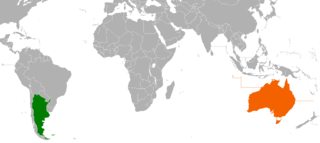
Bilateral relations between Argentina and Australia have existed for years. Both nations are members of the Cairns Group, Forum of East Asia–Latin America Cooperation, G20 and World Trade Organization.

Diplomatic relations between Argentina and Ukraine, have existed for decades. Both nations enjoy friendly relations, the importance of which centers on the history of Ukrainian migration to Argentina. Ukrainians in Argentina form the second largest Ukrainian community in Latin America numbering approximately 250,000 Ukrainians and their descendants. Both nations are members of the World Trade Organization.
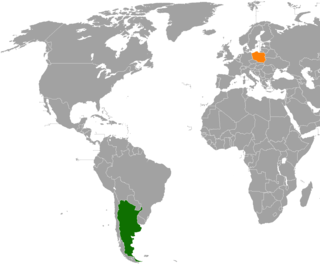
Diplomatic relations between Argentina and Poland, have existed for over a century. Over 500,000 Argentines are of Polish descent making Argentina the second Latin-American country with the largest Polish community abroad.

The Armenian community in Argentina is the largest in Latin America totaling approximately 120,000 members.

Current and historical relations between the Argentina Republic and the Russian Federation have existed for decades. Both nations are members of the G20 and the United Nations.

Diplomatic relations between the Argentine Republic and Hungary have existed for decades. Argentina is host to one of the largest Hungarian communities outside of Hungary. There are approximately 30,000 to 40,000 Argentines of Hungarian descent. Both nations are members of the United Nations.

Armenia–Uruguay relations are foreign relations between Armenia and Uruguay. Uruguay, as a small South American nations hosts a large Armenian community for its size. The Armenian community in Uruguay totals approximately 16,000 people.

Bilateral relations between the Argentina and Finland, have existed for over a century.

The current and historical relations between the Argentine Republic and the Portuguese Republic, have existed for over a century. Both nations are members of the Organization of Ibero-American States and the United Nations.

Algeria and Argentina are members of the Group of 15, Group of 24, Group of 77 and the United Nations.
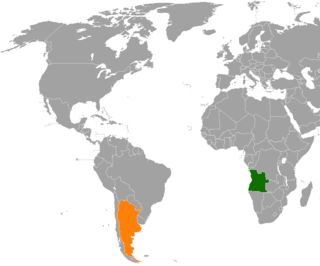
Angola and Argentina are members of the Group of 77 and the United Nations.

Mexico–South Africa relations refers to the diplomatic relations between the United Mexican States and the Republic of South Africa. Both nations are members of the G-20 major economies, Group of 24 and the United Nations.

Poland–Uruguay relations are foreign relations between Poland and Uruguay. Both nations are members of the United Nations.

Netherlands–South Africa refers to the current and historical relations between the Netherlands and South Africa. Both nations share historic ties and have a long-standing special relationship, partly due to the Dutch colony in the Cape, linguistic similarity between Dutch and Afrikaans and the Netherlands’ staunch support in the struggle against Apartheid.

Diplomatic relations between the Argentine Republic and the Republic of the Philippines, have existed for decades. Both nations are members of the Association of Academies of the Spanish Language, Group of 77, the G20 developing nations, and Forum of East Asia-Latin America Cooperation and the United Nations.

Current and historical relations between Argentina and Azerbaijan have existed for decades.
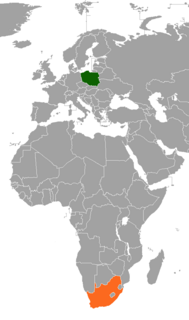
Poland–South Africa relations are the bilateral relations between the Republic of Poland and the Republic of South Africa. Both nations are members of the United Nations and the World Trade Organization.
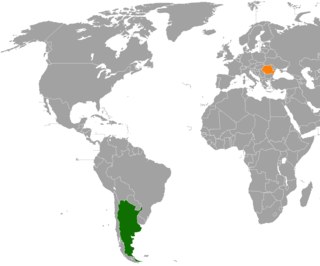
Diplomatic relations between the Argentine Republic and Romania, have existed for over a century. Both nations are members of the United Nations.